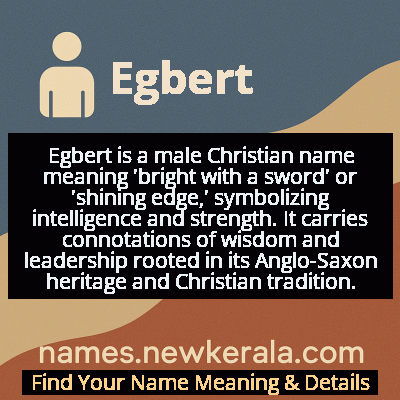Egbert Name Meaning & Details
Origin, Popularity, Numerology Analysis & Name Meaning of Egbert
Discover the origin, meaning, and cultural significance of the name EGBERT. Delve into its historical roots and explore the lasting impact it has had on communities and traditions.
Name
Egbert
Gender
Male
Origin
Christian
Lucky Number
3
Meaning of the Name - Egbert
Egbert is a male Christian name meaning 'bright with a sword' or 'shining edge,' symbolizing intelligence and strength. It carries connotations of wisdom and leadership rooted in its Anglo-Saxon heritage and Christian tradition.
Egbert - Complete Numerology Analysis
Your Numerology Number
Based on Pythagorean Numerology System
Ruling Planet
Jupiter
Positive Nature
Optimistic, inspirational, and creative.
Negative Traits
Scattered, exaggerating.
Lucky Colours
Yellow, gold, purple.
Lucky Days
Thursday.
Lucky Stones
Yellow sapphire.
Harmony Numbers
1, 2, 9.
Best Suited Professions
Arts, writing, communication.
What People Like About You
Creativity, optimism.
Famous People Named Egbert
Egbert of Wessex
King
First king to establish lasting supremacy over other Anglo-Saxon kingdoms
Egbert of Lindisfarne
Bishop
Saint and bishop who defended Lindisfarne against Viking invasions
Egbert of Trier
Archbishop
Influential archbishop and statesman under Holy Roman Emperor Otto III
Egbert B. Brown
Military Officer
Union Army general during the American Civil War
Name Variations & International Equivalents
Click on blue names to explore their detailed meanings. Gray names with will be available soon.
Cultural & Historical Significance
Within Christian contexts, Egbert was borne by several important ecclesiastical figures who contributed to the spread of Christianity throughout Britain and Europe. Saint Egbert of Lindisfarne and other religious leaders bearing this name were instrumental in missionary work and church administration during the early medieval period. The dual association with both secular power and religious authority made Egbert a name that symbolized the ideal Christian ruler—someone who combined worldly leadership with spiritual devotion. This rich historical background gives the name enduring cultural weight, though its usage has become increasingly rare in modern times.
Extended Personality Analysis
The name Egbert is strongly associated with intellectual capability, strategic thinking, and natural leadership qualities. Individuals with this name are often perceived as highly analytical, possessing the ability to process complex information and make well-reasoned decisions. This intellectual characteristic aligns with the name's historical bearers, who were known for their political acumen and administrative skills. Egberts tend to approach life with careful consideration, preferring methodical planning over impulsive action, and often demonstrate remarkable problem-solving abilities in both personal and professional contexts.
Beyond their cognitive strengths, Egberts typically exhibit qualities of reliability, tradition, and moral integrity. They are often seen as pillars of stability in their communities, valuing order and consistency while maintaining strong ethical principles. The name suggests someone who is somewhat reserved yet commands respect through their competence and dignity. Egberts frequently display a quiet confidence that comes from deep self-knowledge and a clear sense of purpose. Their combination of intellectual sharpness and steadfast character makes them particularly effective in roles requiring both wisdom and perseverance.
Modern Usage & Popularity
In contemporary naming practices, Egbert is considered a rare and distinctive choice, primarily selected by parents with a strong appreciation for historical names or Anglo-Saxon heritage. The name has never regained the popularity it held during the early medieval period and remains outside mainstream naming trends in English-speaking countries. Its usage is most common in the United Kingdom, particularly among families with historical connections to regions where Anglo-Saxon influence was strongest. Modern Egberts often find their name serves as a conversation starter due to its uniqueness and historical resonance, though some may choose to use nicknames like Bert, Ebbie, or Egbie in casual contexts. The name's rarity in the 21st century gives it an air of distinction and intellectual sophistication that appeals to parents seeking meaningful traditional names outside current fashion.
Symbolic & Spiritual Meanings
Symbolically, Egbert represents the fusion of intellectual brilliance with practical authority, embodying the concept of enlightened leadership. The name's original meaning of 'bright edge' or 'shining sword' extends metaphorically to represent clarity of thought, the ability to cut through complexity, and the power of discernment. It symbolizes someone who can illuminate truth and provide guidance in challenging situations. The historical association with kingship adds layers of meaning related to sovereignty, responsibility, and the wise exercise of power.
Additionally, Egbert carries symbolic weight as a bridge between ancient tradition and contemporary application. It represents continuity with historical wisdom while allowing for modern interpretation and use. The name suggests enduring values, steadfastness in principle, and the preservation of important cultural heritage. In a broader sense, Egbert symbolizes the ideal of the philosopher-king—someone who combines deep understanding with effective action, and intellectual depth with practical capability, creating a powerful archetype of balanced leadership and moral intelligence.

